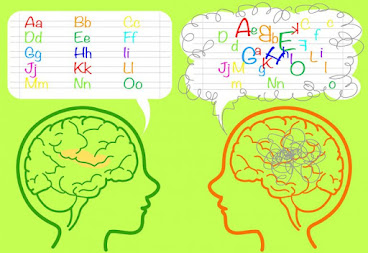Dyslexia
Hello Everyone!
I would like to stay on the topic of certain kinds of disorders and today I would like to focus on dyslexia.
We talk about dyslexia when a child has difficulty
learning to read and write, even though he or she is intellectually able to
learn it, they simply cannot learn the rules associated with it. Children
suffering from dyslexia do not distinguish between sounds and shapes, nor do they
see the difference in the numbers and letters written, and consequently make
many spelling mistakes in one sentence. The dyslexic handwriting is considered
ugly and slurred. Often, such children are wrongly considered lazy and rated
poorly, receiving lower grades than the rest of the children. It is worth
mentioning, however, that dysfunction does not mean that the child is less
intelligent or is developing poorly.
Symptoms of dyslexia appear in children from early
childhood. You can recognize it, for example, by the fact that the child
started to walk immediately, skipping the crawling phase, of course then these
are just guesses. A psychologist can diagnose developmental dyslexia only from
the age of 10.
Children with dyslexia also have problems with mobility,
run awkwardly, fall over, cannot catch the ball, have difficulties learning to
ride a bike.
Other symptoms of dyslexia include:
·
problem
with remembering the sequence of words, e.g. consecutive seasons or days of the
week
·
difficulties
in arranging puzzles or blocks according to the pattern,
· twisting
words, for example, "umberlla" instead of "umbrella"
(occasional mistakes do not herald dysgraphia),
·
difficulties
with identifying sides: left, right,
·
confusing
prepositions: below, above, from, to, etc.,
·
difficulty
arranging items in the recommended order, such as from smallest to largest.
It is worth introducing appropriate exercises for dyslexics as soon as possible, for example practicing reading aloud, doing dictations together, practicing correct writing.




Komentarze
Prześlij komentarz